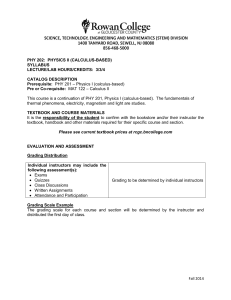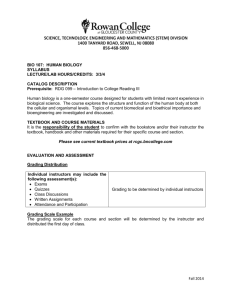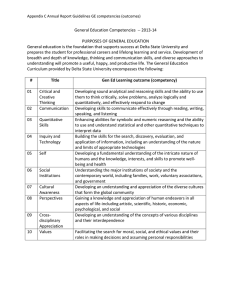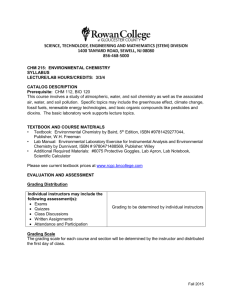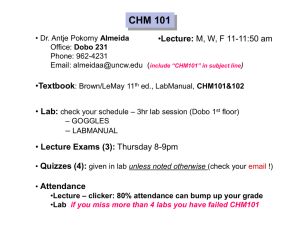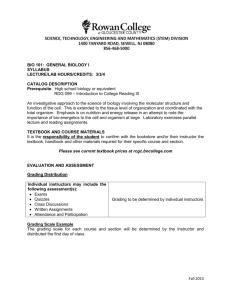CHM 111: GENERAL CHEMISTRY I SYLLABUS LECTURE/LAB
advertisement
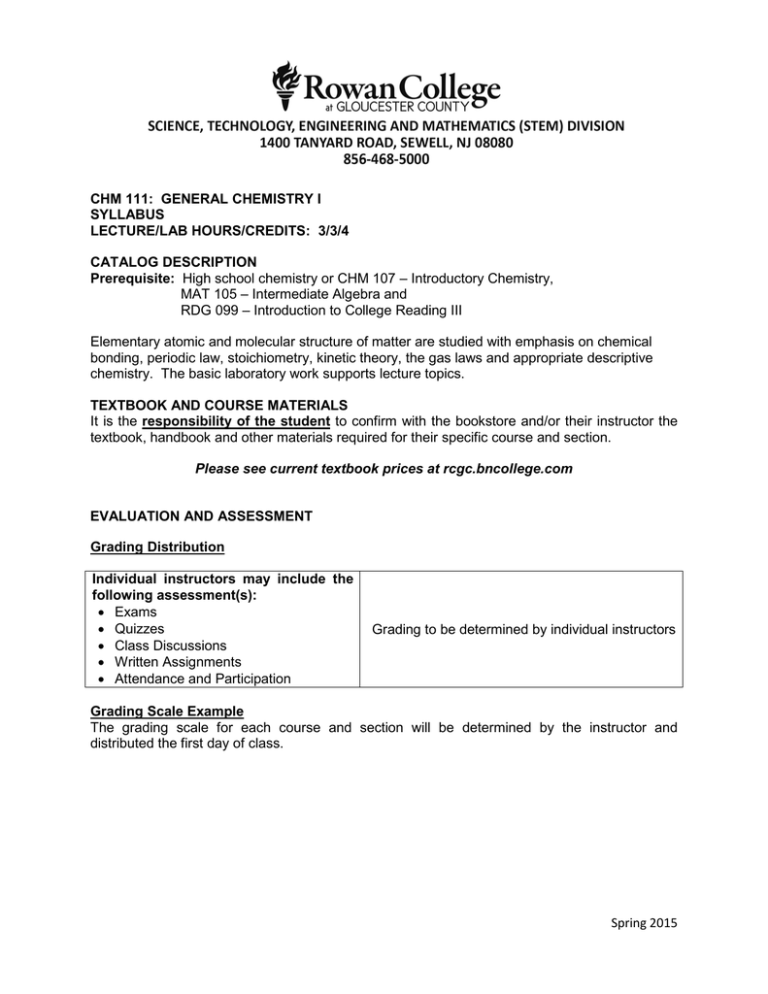
CHM 111: GENERAL CHEMISTRY I SYLLABUS LECTURE/LAB HOURS/CREDITS: 3/3/4 CATALOG DESCRIPTION Prerequisite: High school chemistry or CHM 107 – Introductory Chemistry, MAT 105 – Intermediate Algebra and RDG 099 – Introduction to College Reading III Elementary atomic and molecular structure of matter are studied with emphasis on chemical bonding, periodic law, stoichiometry, kinetic theory, the gas laws and appropriate descriptive chemistry. The basic laboratory work supports lecture topics. TEXTBOOK AND COURSE MATERIALS It is the responsibility of the student to confirm with the bookstore and/or their instructor the textbook, handbook and other materials required for their specific course and section. Please see current textbook prices at rcgc.bncollege.com EVALUATION AND ASSESSMENT Grading Distribution Individual instructors may include the following assessment(s): • Exams • Quizzes • Class Discussions • Written Assignments • Attendance and Participation Grading to be determined by individual instructors Grading Scale Example The grading scale for each course and section will be determined by the instructor and distributed the first day of class. Spring 2015 2 ROWAN COLLEGE AT GLOUCESTER COUNTY CORE COMPETENCIES (Based on the NJCC General Education Foundation - August 15, 2007; Revised 2011) This comprehensive list reflects the core competencies that are essential for all RCGC graduates; however, each program varies regarding competencies required for a specific degree. Critical thinking is embedded in all courses, while teamwork and personal skills are embedded in many courses. RCGC Core Competencies 1 Written and Oral Communication Students will communicate effectively in both speech and writing. 2 Quantitative Knowledge and Skills Students will use appropriate mathematical and statistical concepts and operations to interpret data and to solve problems. 3 Scientific Knowledge and Reasoning Students will use the scientific method of inquiry, through the acquisition of scientific knowledge. 4 Technological Competency Students will use computer systems or other appropriate forms of technology to achieve educational and personal goals. 5 Society and Human Behavior Students will use social science theories and concepts to analyze human behavior and social and political institutions and to act as responsible citizens. 6 Humanistic Perspective Students will analyze works in the fields of art, history, music, or theater; literature; philosophy and/or religious studies; and/or will gain competence in the use of a foreign language 7 Historical Perspective Students will understand historical events and movements in World, Western, non-Western or American societies and assess their subsequent significance. 8 Global and Cultural Awareness Students will understand the importance of a global perspective and culturally diverse peoples. 9 Ethical Reasoning and Action Students will understand ethical issues and situations. Information Literacy 10 Students will address an information need by locating, evaluating, and effectively using information CHM 111 CORE COMPETENCIES This course focuses on two of RCGC’s Core Competencies: • Quantitative Knowledge and Skills • Scientific Knowledge and Reasoning Spring 2015 3 STUDENT LEARNING OUTCOMES: CHM 111 – GENERAL CHEMISTRY I Successful completion of CHM 111 will help students: RCGC Core Competencies Evaluation / Assessment (Additional means of evaluation may be included by individual instructors) 1. Describe matter and perform calculations involving measurement. Recognize chemical names and formulas. - Quantitative Knowledge and Skills - Scientific Knowledge and Reasoning - Quizzes - Exams 2. Demonstrate an understanding of chemical reactions in aqueous solution and perform stoichiometric calculations with chemical formulas and equations. - Quantitative Knowledge and Skills - Scientific Knowledge and Reasoning - Quizzes - Exams 3. Explain elementary thermochemistry, electronic structure, periodic properties of the elements. - Quantitative Knowledge and Skills - Scientific Knowledge and Reasoning - Quizzes - Exams 4. Explain basic concepts of chemical bonding and use them to describe molecular geometry. - Quantitative Knowledge and Skills - Scientific Knowledge and Reasoning - Quizzes - Exams 5. Explain basic properties of gases, liquids, and solids. - Quantitative Knowledge and Skills - Scientific Knowledge and Reasoning - Quizzes - Exams 6. Demonstrate basic laboratory skills and techniques. - Quantitative Knowledge and Skills - Scientific Knowledge and Reasoning - Lab Grade Spring 2015 4 CHM 111 TOPICAL OUTLINE Lecture Lab Introduction: Matter and Measurement Lab Safety Atoms, Molecules, and Ions Determination of Densities of Liquids Stoichiometry: Calculations with Chemical Formulas and Equations Composition of Hydrated Copper(II) Sulfate Reactions in Aqueous Solution Calorimetry Thermochemistry Flame Tests for Metals Electronic Structure of Atoms Perodicity: Reactions of Metals with Acids Periodic Properties of the Elements The Spectrophotometer: Making Solutions Basic Concepts of Chemical Bonding Molecular Structure Molecular Geometry and Bonding Theories Gases Gas Laws Liquids and Intermolecular Forces Vapor Pressure of a Liquid Solids Spring 2015
